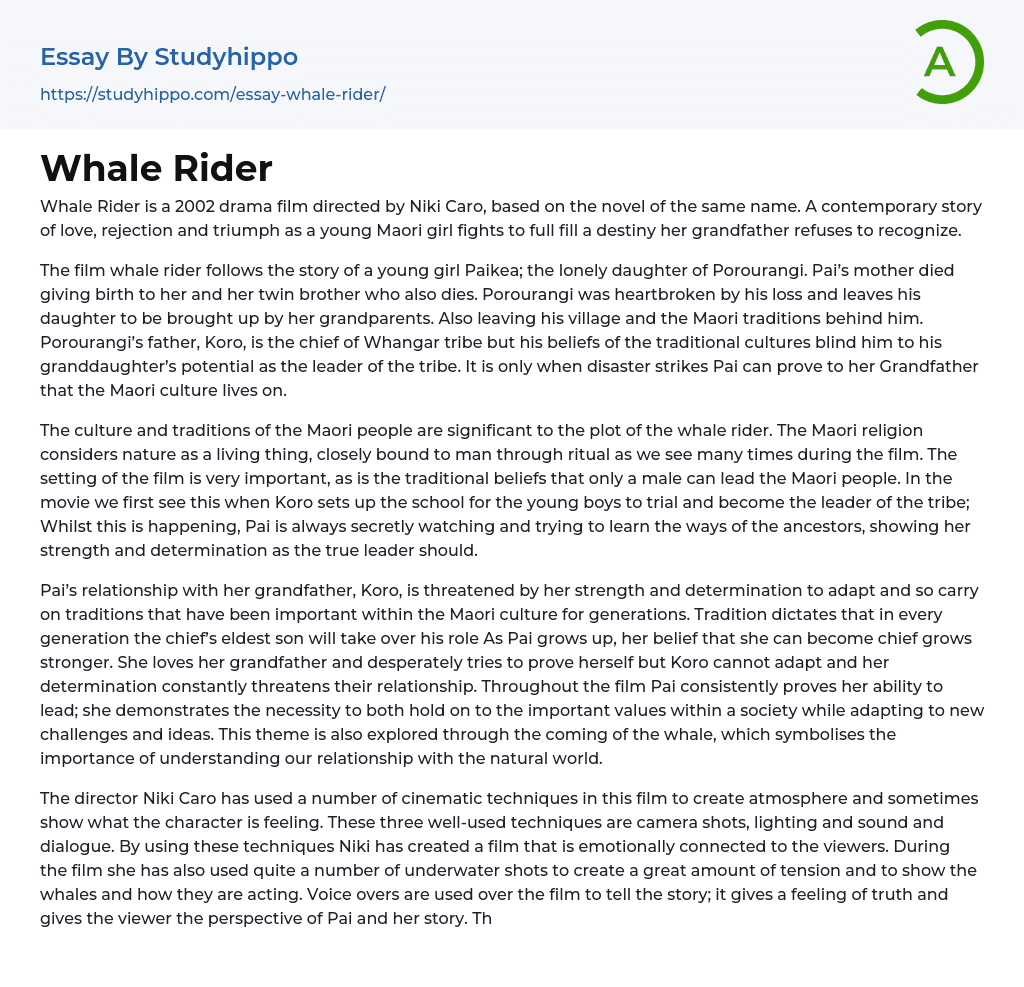Whale Rider is a 2002 drama film directed by Niki Caro. It is based on the novel of the same title and tells a modern story about love, rejection, and triumph. The movie follows a young Maori girl who defies her grandfather's refusal to acknowledge her predetermined path.
The film whale rider tells the story of Paikea, a young girl who is the daughter of Porourangi. Unfortunately, Pai's mother died while giving birth to her and her twin brother, who also passed away. Devastated by this loss, Porourangi abandons his daughter, leaving her to be raised by her grandparents and abandoning his village and the Maori traditions. Koro, Porourangi's father and the chief of the Whangar tribe, is so bound by his beliefs in traditional culture that he fails to see Pai's potential as the tribe's leader. It is only after
...a disaster occurs that Pai is able to prove to her grandfather that the Maori culture still thrives.
The plot of the whale rider centers around the significant culture and traditions of the Maori people. The film depicts the close connection between nature and humanity in Maori religion through various rituals. The setting plays a crucial role, highlighting the traditional belief that only a male can be the leader of the Maori community. This belief is demonstrated early in the movie when Koro establishes a school to train young boys to become the tribe's leader. Meanwhile, Pai, who possesses strength and determination, secretly observes and learns from her ancestors, embodying the qualities of a true leader.
The strength and determination of Pai, the protagonist, endanger her relationship with her
grandfather, Koro. Pai insists on preserving the traditions that have been crucial in Maori culture for years, ultimately challenging the tradition that only the chief's eldest son can assume leadership. While Pai's love for her grandfather remains unwavering, her resolute determination constantly strains their bond. However, throughout the film, Pai consistently proves her ability to lead by emphasizing the need to embrace important societal values while adapting to new challenges and ideas. This theme is further explored through the symbolic arrival of a whale, underscoring the significance of understanding our connection with the natural world.
Niki Caro, the director of this film, has utilized various cinematic techniques such as camera shots, lighting, sound, and dialogue to establish atmosphere and convey emotions. These techniques have been successful in creating a deeply resonating film for its audience. Throughout the movie, underwater shots heighten tension and depict whale behavior. Voice overs provide narration from Pai's perspective on her journey, adding authenticity to the story. The film begins with Pai narrating about her ancestors and emphasizing her relationship with Koro. The music in the movie combines traditional Maori songs, whale sounds, sea sounds, and instrumental music to strongly evoke a sense of place that enhances the film's message.
The film has expanded my understanding of the Maori people, their cultures, and traditions. I have gained knowledge about their beliefs and customs that differ greatly from what I am familiar with. One interesting aspect highlighted in the movie is the gender role in leadership - men are considered suitable leaders while women are treated as inferior. However, Pai challenges this belief and proves that women can be capable
leaders too. Another intriguing aspect is their belief in the interconnectedness of nature and humanity, which is demonstrated by Pai's ability to communicate with whales. Sadly, these whales become stranded and start dying. Nevertheless, Pai comes to their rescue by riding one of them back into the ocean, leading others to follow suit. Her heroic act results in her tribe accepting her as their rightful leader; evidenced when she wears a whale tooth necklace while in hospital.
The film "Whale Rider" has taught me that cultures are diverse and can preserve their ancestral customs. However, societal changes can cause these traditions to change or be lost. Thankfully, there is always a solution, even if it's unexpected. Like the tribe in the film, cultures have the ability to adapt to new circumstances. The rope represents this adaptability and Pai's skill in fixing it offers hope for the future. Embracing change can lead to thrilling new experiences.
- Agriculture essays
- Albert einstein essays
- Animals essays
- Archaeology essays
- Bear essays
- Biology essays
- Birds essays
- Butterfly essays
- Cat essays
- Charles Darwin essays
- Chemistry essays
- Dinosaur essays
- Discovery essays
- Dolphin essays
- Elephant essays
- Eli Whitney essays
- Environmental Science essays
- Evolution essays
- Fish essays
- Genetics essays
- Horse essays
- Human Evolution essays
- Isaac Newton essays
- Journal essays
- Linguistics essays
- Lion essays
- Logic essays
- Mars essays
- Methodology essays
- Mineralogy essays
- Monkey essays
- Moon essays
- Mythology essays
- Noam Chomsky essays
- Physics essays
- Plate Tectonics essays
- Progress essays
- Reaction Rate essays
- Roman Numerals essays
- Scientific essays
- Scientific Method essays
- Scientist essays
- Seismology essays
- Space Exploration essays
- Stars essays
- Sun essays
- Thomas Edison essays
- Tiger essays
- Time Travel essays
- Universe essays




